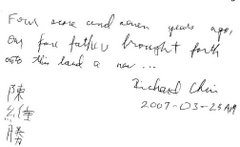This just appeared over the newswire:
Source: Obama to reverse limits on stem cell workBy BEN FELLER and LAURAN NEERGAARD, Associated Press WritersWASHINGTON – Reversing an eight-year-old limit on potentially life-saving science, President
Barack Obama plans to lift restrictions Monday on taxpayer-funded research using
embryonic stem cells. The long-promised move will allow a rush of research aimed at one day better treating, if not curing, ailments from diabetes to paralysis — research that crosses partisan lines, backed by such notables as
Nancy Reagan and the late
Christopher Reeve. But it stirs intense controversy over whether government crosses a moral line with such research.
Obama will hold an event at the White House to announce the move, a senior administration official said Friday. The official spoke on condition of anonymity because the policy had not yet been publicly announced.
Embryonic stem cells are master cells that can morph into any cell of the body. Scientists hope to harness them so they can create replacement tissues to treat a variety of diseases — such as new insulin-producing cells for diabetics, cells that could help those with Parkinson's disease or maybe even Alzheimer's, or new nerve connections to restore movement after spinal injury.
"I feel vindicated after eight years of struggle, and I know it's going to energize my research team," said Dr. George Daley of the Harvard Stem Cell Institute and Children's Hospital of Boston, a leading stem cell researcher.
But the research is controversial because days-old embryos must be destroyed to obtain the cells. They typically are culled from fertility-clinic leftovers otherwise destined to be thrown away.
Under President George W. Bush, taxpayer money for that research was limited to a small number of stem cell lines that were created before Aug. 9, 2001, lines that in many cases had some drawbacks that limited their potential usability.
But hundreds more of such lines — groups of cells that can continue to propagate in lab dishes — have been created since then, ones that scientists say are healthier, better suited to creating treatments for people rather than doing basic laboratory science.
Work didn't stop. Indeed, it advanced enough that this summer, the private Geron Corp. will begin the world's first study of a treatment using human embryonic stem cells, in people who recently suffered a spinal cord injury.
Nor does Obama's change fund creation of new lines. But it means that scientists who until now have had to rely on private donations to work with these newer stem cell lines can apply for government money for the research, just like they do for studies of gene therapy or other treatment approaches.
The aim of the policy is to restore "scientific integrity" to the process, the administration official said.
"America's biomedical research enterprise experienced steady decline over the past eight years, with shrinking budgets and policies that elevated ideology over science. This slowed the pace of discovery and the search for cures," said Sean Morrison, director of the University of Michigan's Center for Stem Cell Biology.
Critics immediately denounced the move.
"Taxpayers should not have to foot the bill for experiments that require the destruction of human life," said Tony Perkins of the conservative Family Research Council. "President Obama's policy change is especially troubling given the significant adult stem cell advances that are being used to treat patients now without harming or destroying human embryos."
Indeed, there are different types of stem cells: So-called adult stem cells that produce a specific type of tissue; younger stem cells found floating in amniotic fluid or the placenta. Scientists even have learned to reprogram certain cells to behave like stem cells.
But even researchers who work with varying types consider embryonic stem cells the most flexible and thus most promising form — and say that science, not politics, should ultimately judge.
"Science works best and patients are served best by having all the tools at our disposal," Daley said.
Obama made it clear during the campaign he would overturn Bush's directive.
During the campaign, Obama said, "I strongly support expanding research on stem cells. I believe that the restrictions that President Bush has placed on funding of human embryonic stem cell research have handcuffed our scientists and hindered our ability to compete with other nations."
He said he would lift Bush's ban and "ensure that all research on stem cells is conducted ethically and with rigorous oversight."
"Patients and people who've been patient advocates are going to be really happy," said Amy Comstock Rick of the Coalition for the Advancement of Medical Research.
The ruling will bring one immediate change: As of Monday, scientists who've had to meticulously keep separate their federally funded research and their privately funded stem cell work — from buying separate microscopes to even setting up labs in different buildings — won't have that expensive hurdle anymore.
Next, scientists can start applying for research grants from the National Institutes of Health. The NIH already has begun writing guidelines that, among other things, are expected to demand that the cells being used were derived with proper informed consent from the woman or couple who donated the original embryo.


